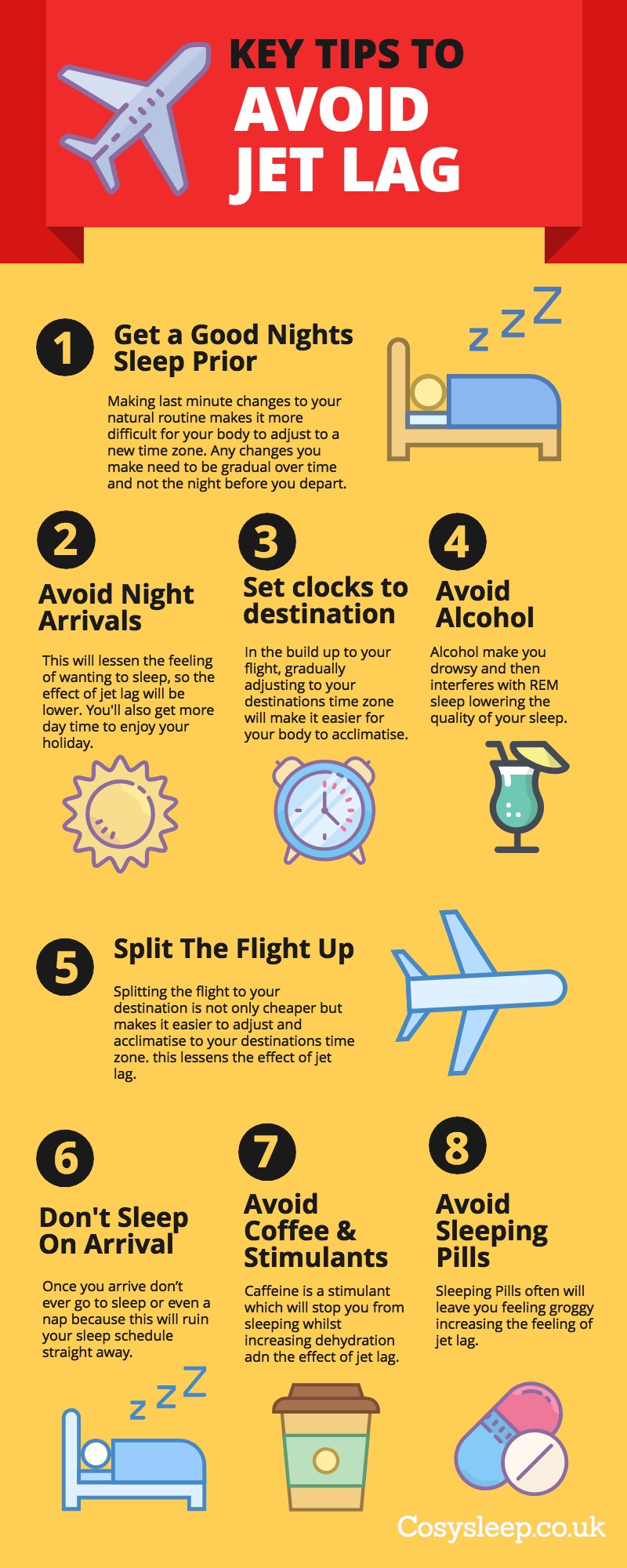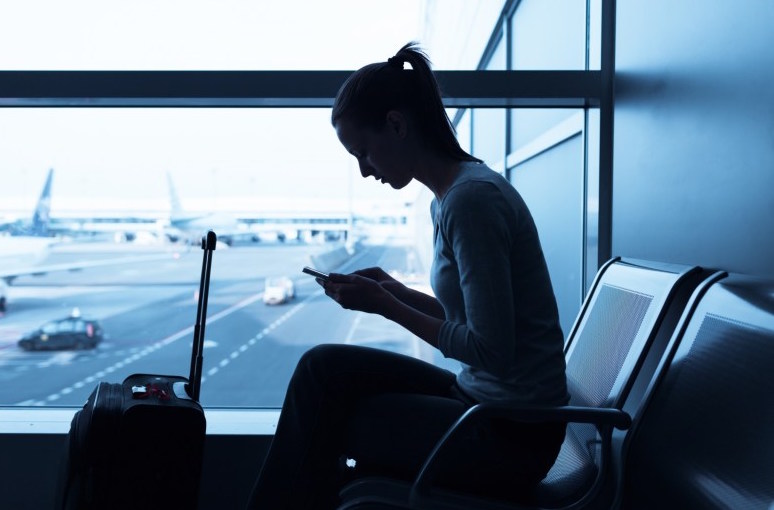We all like to travel to new countries, but jet lag is a common side effect that people suffer from. However, there are ways to eliminate the effects so when you arrive you can get straight on with your holiday instead of wasting a day or two trying to adjust to the new time zone.
This guide will show you how, so you can step off the plane and enjoy your holiday right from the beginning without feeling like sleeping as soon as you reach the hotel.

What is Jet lag and how is it caused?
Jet lag happens when you travel into different time zones over a short period which causes the body’s circadian rhythm to go out of sync. It's often referred to as a temporary sleep disorder.
Circadian rhythm is the natural internal clock inside of your body, that uses cues from the external environment to set your body’s sleep cycle. i.e. your body knows that when the sun goes down that it’s time to sleep and when the sun begins to rise that it's almost time to wake.
Jet lag can lead to a number of unwanted symptoms including:
- Tiredness
- Lack of Concentration
- Indigestion
- Loss of appetite
These symptoms can affect different people in different ways depending on your age, health and how you prepare for your flight to minimise the effects.
How to reduce effects of jet lag
1. Get a Good Nights Sleep Before You Fly
It’s common that most people end up only sleeping for a few hours before their flight which happens for many reasons including last minute packing or even trying to tire out your mind and body so you can sleep through the flight.
This is not what you should do, because making last minute changes to your natural routine makes it more difficult for your body to adjust to a new time zone. Ideally, you need to get a full nights sleep before your flight.

2. Avoid Arriving at Night
If it’s possible you should choose a flight that allows you to arrive in the day time because it’ll make it easier to stay awake. Even if you arrive with jet lag, you’ll be more likely to go out and explore your new destination.
Although flights generally cost slightly more to arrive in the day versus coming at night, you’ll get more holiday time and gain an extra day on holiday.
You can even take it one step further and only visit destinations that share the same time zone as the UK. However, this will limit your options significantly, but will almost wipe out jet lag symptoms completely.
3. Avoid Alcohol
Hydration is an essential factor to stay on top of because it decreases fatigue and generally makes you a happier person. For this reason, alcohol should be avoided because it has side effects that make you tired and then interferes with REM sleep lowering the quality of your sleep.
Alcohol is also a diuretic which will make the cells in your body dehydrated quicker which will increase the likelihood of experiencing jet lag. Water is usually free on most airlines, so be sure to get a glass each time the air hostess brings the trolley around.
4. Avoid Sleeping Pills
Even if you struggle to sleep, using sleeping pills on longer haul flights should be avoided because they will increase the effects of jet lag even if they're successful in making you fall off to sleep. Sleeping pills often leave you feeling groggy when you wake which is the opposite of what you’re trying to achieve.

If you need to sleep, then you should try and do it naturally without medication, and there are several alternatives such as herbal tea, which can calm nerves and anxiety making it easier to fall asleep.
5. Split the Flight Up
A fundamental way to avoid jet lag is to arrange a stopover during your flight where you stop at a location halfway to your end destination. This also has the added benefit of decreasing your overall flight fare.
When you stop halfway, your body has an easier time adjusting to this new time zone and then when you reach your end destination, the adjustment your body needs to make is much smaller and takes less time.
6. Avoid Blue Light Exposure at Night
Let’s face it, we’re addicted to screens. Whether it’s mobile phones, laptops or other electronics, we spend anywhere from 3 to 8+ hours looking at these devices and it’s usually near the higher end when we’re travelling.
These electrical devices emit blue light through their screens which can cause disruption to our sleep cycles. This blue light suppresses the release of Melatonin which is the hormone responsible for making us feel tired and ready for sleep.
We know that it can be almost impossible for most of us to put these devices down, but there are ways to reduce the exposure without having to turn them off”
Turn down the brightness
When you use your electronic device you should ensure that you lower the brightness. Many modern devices have a night time or evening mode. This can reduce the amount of blue light that reaches the back of our eyes. Lowering the brightness at night also decreases the amount of strain that your eyes experience.
Wear Blue Light Blocking Glasses
Now you may have seen these glasses before and wondered how effective they are. They need to be worn in the evening and they work to reduce the amount of blue light that is absorbed into your eyes meaning that Melatonin production is not inhibited.
Install a Blue Light Filter on Laptop or Mobile Phone
If you’ve got one of the latest laptops or mobile phones then they may have a blue light filter pre-installed. If your device doesn’t then you can download them for free online and set a timer for it to automatically turn on when daylight starts to drop.
7. Adjust Your Schedule to Destination
In the build-up to your flight, adjusting to your destinations, time zone will make it easier for your body to acclimatise. You should do this gradually by changing your bedtime by an hour towards your target time zone each night.
This also applies to meal times so that if you're making a substantial time zone change, your body doesn’t expect to get a large evening meal when it's mid-morning.
8. Don’t Sleep When You Arrive
Once you arrive, don’t ever go to sleep or even a nap because this will ruin your sleep schedule straight away. A common mistake people make is still working to the time back home, but you need to focus on the time zone you’re in now.
The key is to keep yourself busy, so you don’t feel the need to sleep, which can be done by venturing out and going for a walk or exploring. Daylight helps to adjust your internal body clock so being outside will provide significant help.
9. Avoid Coffee
Avoid consuming drinks or food that contain high levels of caffeine including coffee and fizzy energy drinks. Caffeine is a stimulant which will stop you from sleeping while increasing the effect of jet lag.
Caffeine can cause dehydration so instead of consuming caffeine you should stick to water.
10. Set Watch and Clock to Destination Time
Once you get on the plane, you should set it to the time of your destination so you can start to adjust yourself to your new time zone both physically and psychologically.
At least then if you do need to sleep, you can mimic the same sleep schedule that you’ll have when you reach your final destination.
11. Sleep
In this guide, we’re not saying you shouldn’t sleep at all, but you need to be a little bit more strategic to ensure that you don’t feel the full effects of jet lag. A significant cause of jet lag is tiredness and a lack of sleep, so getting sufficient sleep to reduce the symptoms of jet lag when you arrive.
Again, you should time your sleep around the time of your destination and not the time zone of where you’ve departed from.
12. Manage Your Diet
It’s normal that when we go away we switch into holiday mode which means that we overindulge in things that we may be strict with back home. One of these things is the food we consume, but have you ever considered that food can have an effect on jet lag.
For example, heavy foods such as carbohydrate heavy meals can make you feel tired and heavy which can lead to increasing the effect of jet lag.
If you do need to eat a heavier meal then try to time it around your natural sleeping pattern. Otherwise, stick to lighter foods such as meat and fish which can leave you feeling full but not sluggish.
13. Experiment with Melatonin
Although sleep pills are a no go, Melatonin can play a role in decreasing the effects of jet lag. Melatonin is a natural hormone that is found in the body and produced in the brain which signals to your body that it’s time for bed.
Taking this supplement will make it easier to fall asleep and is useful if you’re struggling to get your body to acclimatise to your new sleeping pattern when you enter a different time zone.
We recommend taking 0.5mg of Melatonin two to three hours before your required sleep time which will help to not only improve your nighttime sleep but also your alertness the following day.
14. Don’t Forget the Return Journey
It’s common that we remember to take all these steps to reduce jet lag on the outward journey but neglect the return journey. By not doing this on your way home you risk suffering from the same effects that you tried to avoid.
This will help to reduce the classic “holiday blues” feeling that is often experienced on your first day back at work after a holiday.
15. Arrive Early
If you’re travelling for an important meeting or event, then try to arrive at your destination a day or two before to give your body a chance to adjust to the new time zone.
This is recommended for those who have tried everything else on this list but still suffer from jet lag.
16. Stay Hydrated
Ensure that you drink plenty of water before, during and after your flight to fight off the dehydrating effects that are caused by dry cabin air. Dehydration can make the symptoms of dehydration considerably worse.

